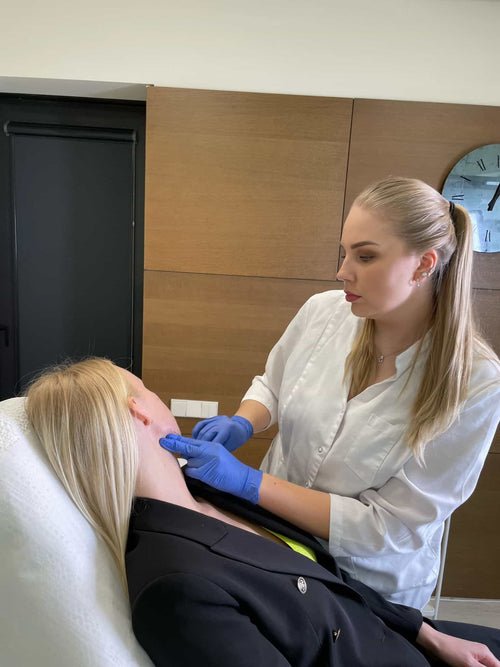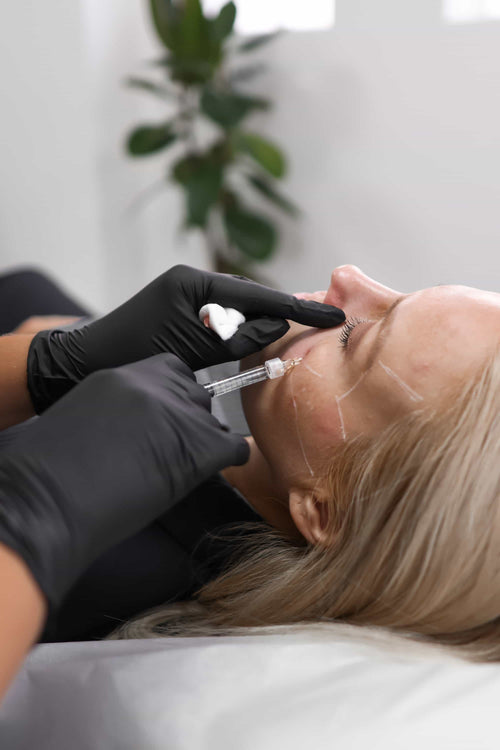Who Is Not Suitable For Lip Filler?
Book a Dermal Filler Appointment with Dr. Laura Geige at It’s Me and You Clinic
Health Conditions
Bleeding Disorders
Bleeding disorders can pose significant risks for individuals considering lip filler injections. These disorders affect the body’s ability to clot blood properly, increasing the likelihood of excessive bleeding during and after the procedure.
Book Your Dermal Filler Consultation with Dr. Laura Geige Today
Hemophilia, von Willebrand disease, and platelet disorders are examples of conditions that can increase bleeding risk.
In individuals with these disorders, even minor injuries can result in prolonged bleeding, which could be exacerbated by the invasive nature of lip filler injections.
Excessive bleeding can lead to hematomas (blood clots under the skin), swelling, pain, and potential complications such as infection.

It’s crucial for anyone with a history of bleeding disorders or taking blood-thinning medications to consult with their physician before considering lip fillers.
The doctor can assess the individual’s specific condition and advise on whether the procedure is safe and appropriate.
In some cases, alternative treatments or modifications to the procedure may be recommended to minimize risks.
Autoimmune Diseases
Health conditions can significantly influence suitability for lip fillers. Certain medical conditions, especially those affecting the immune system or blood clotting, pose increased risks.
Autoimmune diseases, where the body’s immune system mistakenly attacks its own tissues, are a prime concern. Individuals with autoimmune disorders like lupus, rheumatoid arthritis, or Sjögren’s syndrome have a higher risk of complications from lip fillers.
These complications can range from excessive bruising and swelling to allergic reactions, infections, and the filler migrating away from the intended area.
Furthermore, autoimmune diseases often involve inflammation, which can make the injection site more sensitive and prone to complications.
It’s crucial for anyone considering lip fillers to have a thorough medical evaluation beforehand, disclosing all health conditions, including any history of autoimmune disorders.
A qualified and experienced injector will carefully assess the patient’s overall health and risk factors to determine if lip fillers are safe and appropriate.
Rosacea or Eczema
Determining who is a suitable candidate for lip filler involves considering various health conditions, as certain factors can increase risks or complications.
Individuals with active skin conditions, such as:
-
Rosacea
-
Eczema
should consult their dermatologist before considering lip filler. These conditions can cause inflammation and sensitivity in the skin, making it more prone to adverse reactions to filler injections.
Rosacea is a chronic inflammatory skin condition that primarily affects the face, causing redness, flushing, visible blood vessels, and sometimes small bumps or pimples. Eczema, also known as atopic dermatitis, is a condition characterized by dry, itchy, and inflamed skin. Both conditions can make the lips sensitive and susceptible to irritation.
Injection of lip filler into already irritated or inflamed skin can exacerbate these symptoms, leading to worsened redness, swelling, itching, and discomfort.
It’s crucial for individuals with rosacea or eczema to manage their skin condition effectively before considering any cosmetic procedures.
Stable skin conditions under good control may be suitable for lip filler. However, a thorough consultation with a qualified dermatologist is essential to assess the individual’s specific situation and determine the appropriate course of action.
Pregnancy and Breastfeeding
Hormonal Changes
Pregnancy and breastfeeding are significant physiological states that involve profound hormonal changes, which can impact a person’s suitability for cosmetic procedures like lip fillers.
During *pregnancy*, hormone levels fluctuate dramatically. These fluctuations can affect the body’s ability to heal and respond to injections, potentially increasing the risk of complications or an unpredictable outcome.
Furthermore, certain fillers contain ingredients that may not be safe for a developing fetus.
Breastfeeding mothers also experience hormonal shifts as their bodies produce milk.
Similar to pregnancy, these changes can influence healing and potentially affect the safety and efficacy of lip fillers.
It’s crucial for individuals who are pregnant or breastfeeding to consult with a healthcare professional before considering any cosmetic procedure, including lip fillers.
The doctor can assess individual circumstances, risks, and potential benefits.
They may recommend postponing the procedure until after breastfeeding has ceased or until it’s deemed safe for both mother and child.
Potential Risks to the Baby
Pregnancy and breastfeeding are significant physiological changes that can impact a person’s suitability for cosmetic procedures, including lip fillers.
Book a Dermal Filler Appointment at It’s Me and You Clinic with Dr. Laura Geige

During pregnancy, hormonal fluctuations can increase blood flow and tissue sensitivity, making it more difficult to predict the results of lip filler injections. Additionally, there may be concerns about the potential transfer of substances from the filler to the developing fetus.
While research on the specific effects of lip fillers during pregnancy is limited, many healthcare providers recommend avoiding cosmetic injections during this time as a precautionary measure. The risks to the baby are unknown.
Breastfeeding mothers should also exercise caution when considering lip fillers. Some filler ingredients may be excreted in breast milk and could potentially pass to the infant.
The potential risks to the baby from exposure to lip filler ingredients through breast milk are not well understood, and some manufacturers advise against breastfeeding for a period after receiving injections.
It is crucial for anyone considering lip fillers to have an open and honest conversation with their healthcare provider about their medical history, including pregnancy and breastfeeding status. This will help determine the safest course of action.
Certain Medications
Blood Thinners
Certain medications can impact the healing process and increase the risk of complications associated with lip fillers.
It’s crucial to consult with a qualified medical professional before getting lip fillers if you are taking any of the following:
-
Blood thinners:
Blood thinners, also known as anticoagulants, prevent blood clots from forming. While essential for individuals at risk of stroke or heart attack, they can significantly increase bleeding and bruising during and after lip filler injections.
Common blood thinners include:
-
Warfarin (Coumadin)
-
Heparin
-
Aspirin
-
Clopidogrel (Plavix)
Other medications that may affect lip filler results or increase the risk of complications include:
-
Antibiotics
-
Certain antidepressants
-
Herbal supplements
A medical professional can assess your individual health history, medication list, and potential risks to determine if lip fillers are safe for you.
They may recommend adjusting your medication dosage or temporarily discontinuing certain medications before the procedure to minimize risks.
Acne Medications
While lip fillers offer a popular way to enhance lip size and shape, certain medications can impact their efficacy or increase the risk of complications. Individuals considering lip fillers should consult with a qualified medical professional to discuss their complete medication history.
Some medications that may pose concerns include blood thinners like aspirin, ibuprofen (Advil, Motrin), and warfarin (Coumadin). These medications can increase bleeding, making it more difficult for the filler to settle properly and potentially leading to bruising or swelling. It’s important to note that temporary cessation of blood thinners might be recommended under a doctor’s supervision prior to the procedure.
Other medications that could interact with lip fillers include:
• **Antibiotics:** Certain antibiotics can affect wound healing and increase the risk of infection. It’s important to disclose any recent antibiotic use to your injector.
• **Isotretinoin (Accutane):** This potent acne medication significantly impacts skin health and collagen production. Individuals who have taken Accutane recently should not receive lip fillers, as it can increase the risk of filler complications like lumps or irregularities.
• **Retinoids:** While milder than Accutane, retinoids like retinol and tretinoin can also thin the skin and affect collagen. It’s best to avoid using topical retinoids for a few weeks before and after lip filler injections.
Always remember that this information is not exhaustive. It is crucial to consult with a qualified medical professional who can assess your individual medical history, medications, and suitability for lip fillers.
Anti-Inflammatory Drugs**
Anti-inflammatory drugs (also known as NSAIDs) can impact the results of lip fillers.
NSAIDs, such as ibuprofen and naproxen, work by reducing inflammation in the body. This effect can interfere with the healing process after a lip filler injection.
Taking NSAIDs before or after your procedure can increase bleeding, bruising, and swelling at the injection site.
It can also make it more difficult for the filler to hold its shape and achieve the desired results.
Therefore, it’s important to consult with a qualified injector before taking any NSAIDs, especially in the days leading up to and following your lip filler treatment.
They will assess your individual medical history and advise you on the best course of action.
In some cases, they may recommend temporarily stopping NSAID use before the procedure.
Super Sleep Yoga The CBD Consultancy Made by Penny Christina Stambolian
- Who Should Not Do Filler? - November 8, 2025
- What Is Premium Lip Filler - November 6, 2025
- Weed Beverages That Don’t Taste Like Weed - November 4, 2025
